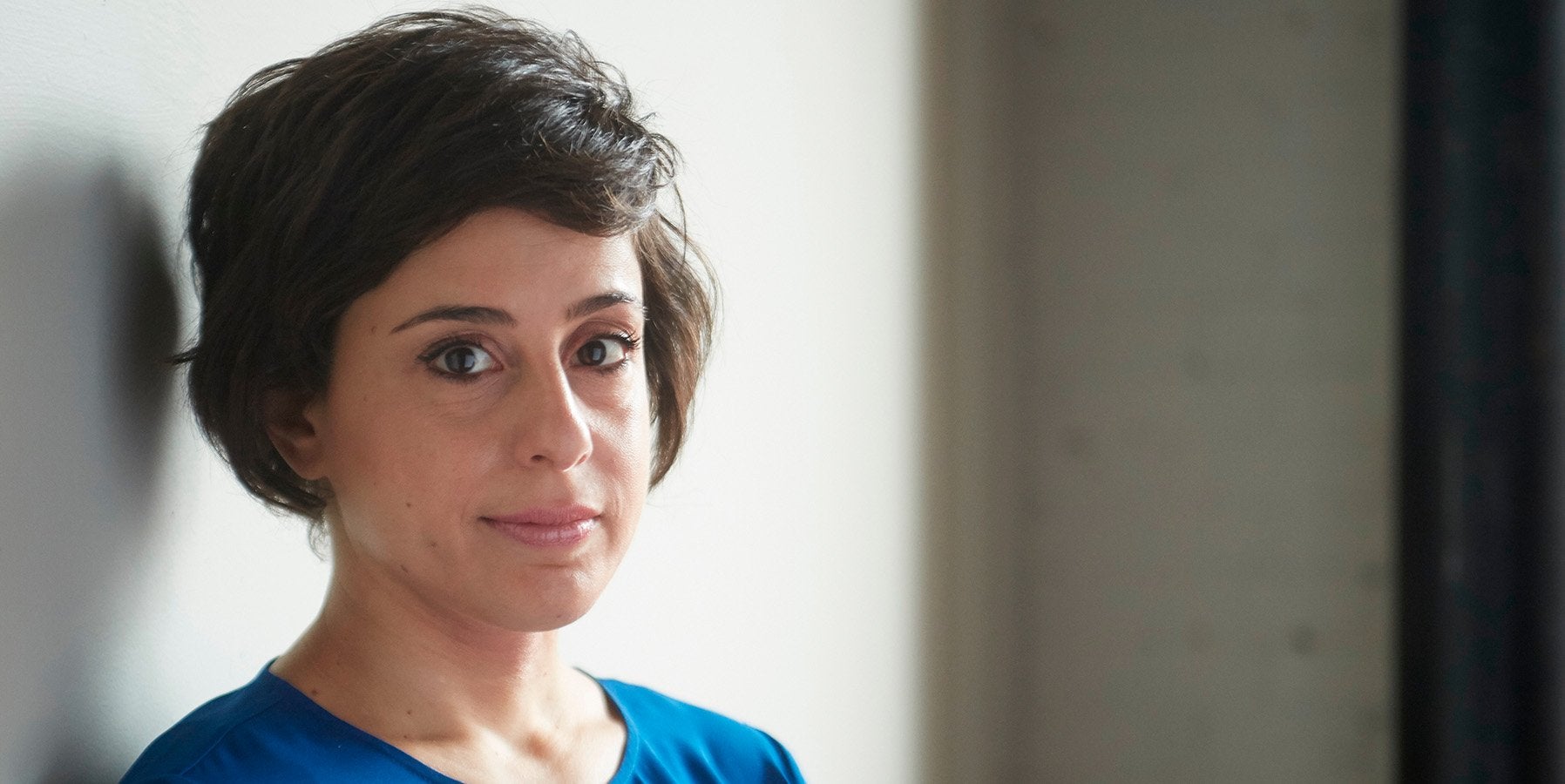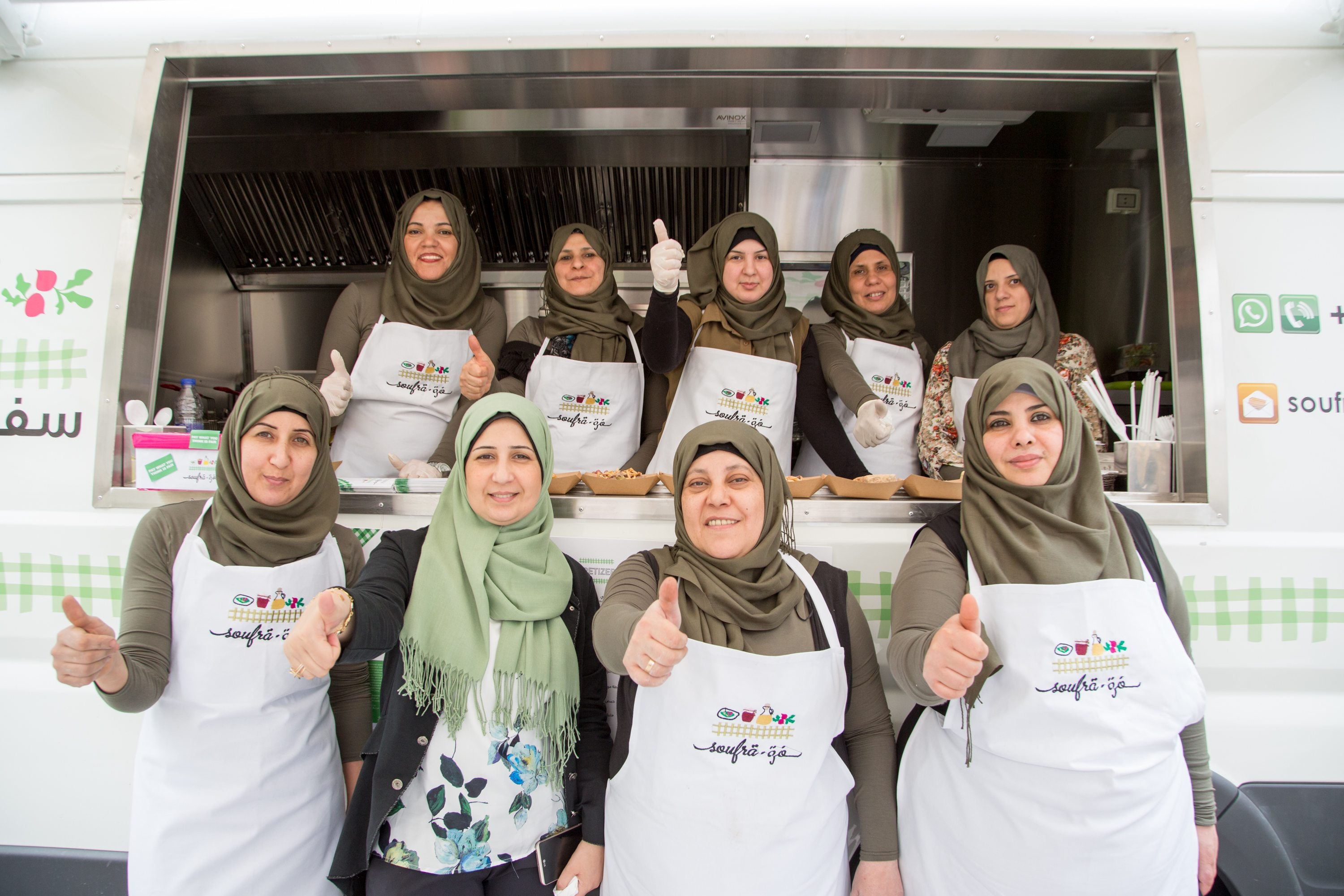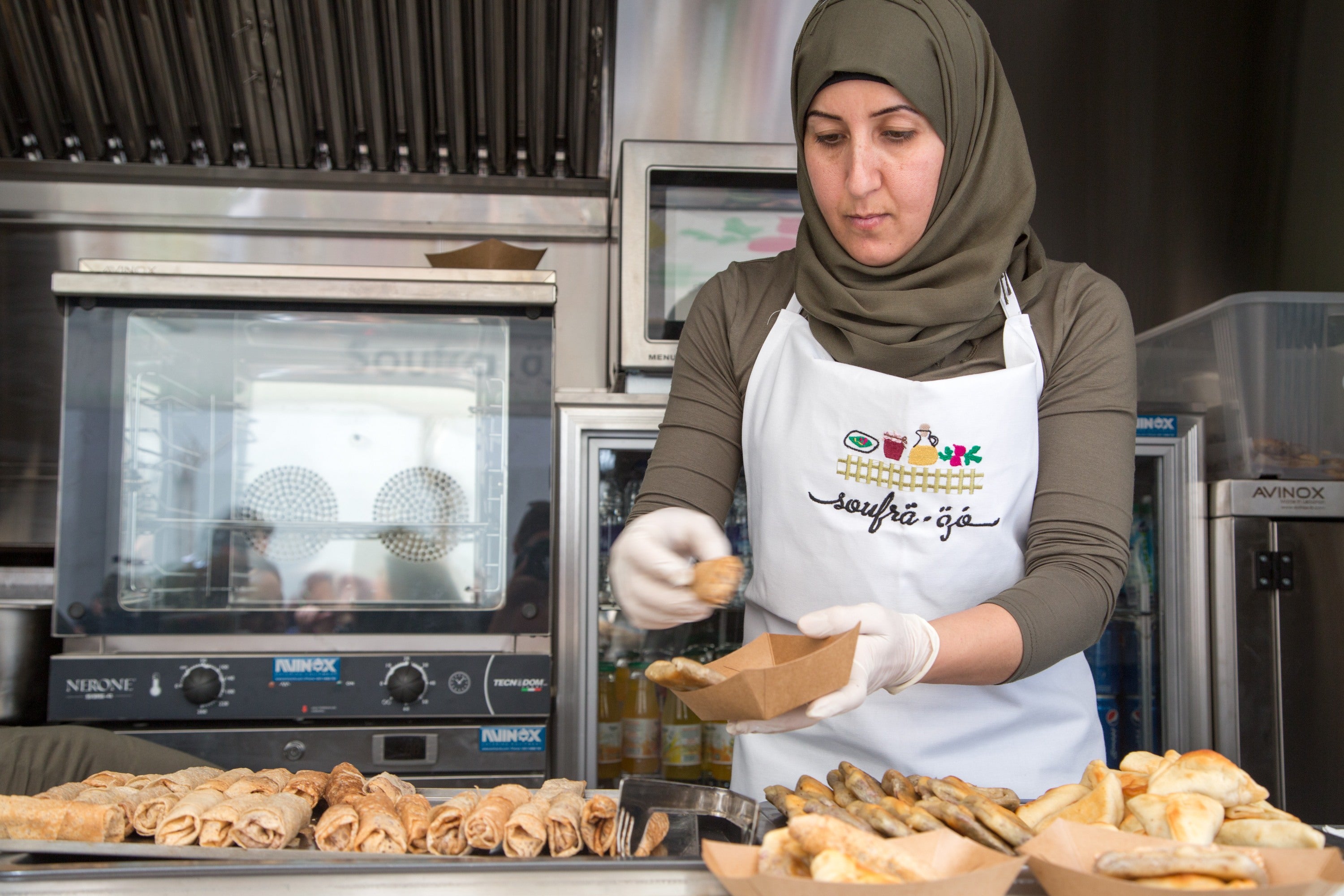
The Burj el-Barajneh refugee camp sprawls on the southern outskirts of Beirut. Crumbling brick buildings are piled haphazardly upon one another. The narrow alleys between are strewn with trash and strung with water conduits and electricity cables that provide only sporadic running water and power. Housing more than 30,000 inhabitants within one square kilometer, the camp is a place of continual struggle for Palestinian—and, increasingly, Syrian—refugees, who subsist on U.N. handouts and face severe restrictions on employment. It’s the last place you’d expect to nd anything as au courant as a food truck. But in 2014, a group of women who were frustrated that many of the potential customers for their catering business lived outside the camp turned for help to Alfanar Lebanon, a “venture philanthropy” organization that helps social service organizations become more sustainable.
“We told them, ‘We have to double or triple your business ASAP,’” says Teresa Chahine, SD ’10, who launched Alfanar Lebanon in 2012. During a brainstorming session, someone floated the idea of food trucks—vehicles for indulgence that are ubiquitous in the West but only starting to crop up in Lebanon. A truck, the women realized, could boost the market for their deliriously tasty stuffed grape leaves and spicy pepper dip. “They’ll smell your amazing food and want to buy it,” the Alfanar team told them.

With Chahine’s help, the women undertook a Kickstarter campaign, looking to raise $47,000 to buy and outfit a truck. By the time the campaign ended in December 2015, 900 donors had contributed more than $60,000 and the business took off.
That is the kind of miracle that Chahine orchestrates daily as one of the leading lights of the growing field of social entrepreneurship, a hybrid of startup culture and charity work that applies business solutions to social problems. It’s an unusual path for a graduate of a school of public health, which traditionally teaches students how to influence health outcomes through government policy and nonprofit interventions, not business solutions.
But Chahine has pushed the bounds of the field, bringing her passion back to the Harvard Chan School with a course she’s taught since 2013 and a new book on the topic that is starting to change the way that public health is conceived. “She radiates confidence and empathy and concern,” says Myrna Atalla, executive director of Alfanar, the parent company of Alfanar Lebanon. “In a region that is awash with disaster and refugees and obstacles, that is not only refreshing to work with but also absolutely necessary.”
Lebanon to Texas, and Back Again
Chahine traces that optimism to her childhood years, when her family had to flee Lebanon’s civil war for the U.S. “A lot of my idealism comes from my upbringing in Texas,” she says. While her childhood friends in Lebanon were running for bomb shelters as air raid sirens screamed, or grieving the death of a loved one or neighbor, Chahine was enjoying a sheltered childhood in the green fields of a Dallas suburb.
“I was the weird girl who moved to Texas from Lebanon to escape the war,” she says. “No one in my class had ever moved anywhere or even heard of a small country like Lebanon. But instead of getting picked on or shunned, I was embraced by the tightknit community, who rallied to help my family feel at home. The school we went to and the families who befriended us were made of such a strong social fabric that we felt extremely safe, secure, and loved. We learned to trust people.”
When Chahine returned to Lebanon for high school, she brought with her a conviction about the vital importance of a well-functioning society—a belief that many of those around her had lost after the privations of war. At the American University of Beirut, she studied biology, intending to go into cancer research. But genetic breakthroughs seemed distant compared with the suffering she saw around her. “I thought: I am living in a society that can’t take care of its basic needs.” After she began coordinating a youth program at the ministry of social a airs, a mentor suggested that public health might help her combine scientific research with her passion for social change. “This is where I found my tribe,” she says about coming to the Harvard Chan School in 2005.
Solving Social Problems
Chahine’s dissertation assessed risks to communities from exposure to toxic chemicals. “She was a top graduate scholar pursuing high-quality scholar- ship, but it was clear she wanted to do more than just pursue academics,” says SV “Subu” Subramanian, professor of population health and geography in the Department of Social and Behavioral Sciences. While the Harvard Chan School was renowned for producing high-quality research, he adds, historically it had not focused as strongly on professional training.
“We talk about problems, we write about problems. I felt like we weren’t solving problems,” explains Chahine. It wasn’t until her last semester that Chahine discovered the Harvard Social Enterprise Conference—a collaboration between Harvard Business School and the Harvard Kennedy School—that uses business approaches to solve social problems. “I realized that there was actually a name for a lot of the things I had been thinking about and a whole field dedicated to what I wanted to do,” she says.
Middle Ground Between Charity and Startup
Social entrepreneurship is dedicated to “designing and implementing solutions to tackle social problems in ways that are effective, replicable, and financially viable,” says Chahine. As an example, she points to Aravind Eye Care System in India, which since 1978 has provided first-rate eye care to patients, regardless of their ability to pay. Those who can afford it are charged a full fee, which then subsidizes those who cannot. “The goal is to provide the best-quality health care,” she says. “The revenue is a means to an end.”
Without income to sustain themselves, organizations promoting social change typically get caught up chasing funding from charities and foundations. “Instead of saying, ‘This is my mission, now get out of my way,’ they say, ‘Donors seek orphans, or donors seek widows, let me go after that,’” says Chahine. “But what donors are looking for is always changing and isn’t always what the people we serve want or need. The more a group can become independent, the more control they have over the services they can provide.”
By inhabiting a middle ground between charity and startup, social enterprises can be scrappy, taking risks, failing fast, and bootstrap- ping ideas without getting tied up in bureaucracy. “When you are small, you can test out solutions faster and maybe propose ideas that could later be adopted by government,” Chahine says.
She cites the example of Albina Ruiz, a Peruvian environmentalist who was frustrated by the piles of trash in poor neighborhoods in Lima, which were as much an eyesore as they were a health hazard for the waste pickers who scavenged through the detritus. Reaching out to the municipal government, Ruiz formulated a plan to make the pickers a part of the solution, organizing them to collect trash and bring it in for recycling, which they would then be paid for. That organization, Ciudad Saludable, now removes a health and environmental hazard while also providing employment to community members.
In 2012, Chahine got her own chance to pursue change. Alfanar (meaning “beacon” in Arabic), the Arab region’s first venture philanthropy organization, began expanding its investment and support to ambitious social enterprises across the Arab countries. At the same time,
the Arab Spring was empowering a new generation of activists and entrepreneurs to solve social problems. Alfanar reached out to Chahine to launch Alfanar in Lebanon. “Teresa has an exceptional emotional intelligence,” says Myrna Atalla. “When she meets a social entrepreneur in a refugee camp or the heart of Beirut, she is adept at respecting where they are and very gently coaching them through a growth process.”
The women from the Women’s Program Association in the Burj el-Barajneh camp approached Alfanar to start a catering business to create jobs and help o set the costs of their other social purpose activities— tutoring, job training, and microloan programs. But none of them had ever cooked professionally. Chahine, however, could see the women’s talent and willingness to work and understood their need for flexible jobs that would allow them to support their families. She helped them put together a solid business plan and arranged for seed funding to get the group started, including a zero-interest loan from Alfanar. “Teresa was able to see miles away that this could work,” says Atalla.
Economic Empowerment and Health
A growing body of evidence points to a direct link between women’s socioeconomic empowerment and better health. The World Health Organization has found that women with more economic agency are more likely to access health services and less likely to suffer from domestic abuse. And according to the World Bank, when women have more control over household finances, they are more likely to spend it in ways that benefit their children—for example, by buying more nutritious food and investing in children’s education.
“There is a big ripple effect,” says Chahine, who has seen the women in the camp transform from passive members of society to active leaders in their community. Although they started the business to sell food outside the camp, they have since pushed to sell healthy snacks and meals to children in the U.N. schools inside the camp as well. And with the publicity from the Kickstarter campaign, they caught the attention of a German nongovernmental organization, which has agreed to build a day care center within the camp—a dream long deferred because of cost constraints.
In 2012, Chahine returned to the Harvard Chan School to spread the gospel of social entrepreneurship back home. “I went to the curriculum committee and said it’s ridiculous that I spent five years here and never knew about this field until I stumbled on it across the river,” she recalls. Her proposal met with a receptive audience, coinciding with a push by then-Dean Julio Frenk to place more emphasis on professional education and explore new pedagogies such as case-based learning.
“It wasn’t a hard sell,” Chahine says. “A lot of people wanted to see a more action-oriented curriculum. Sometimes it just takes the right catalyst to come along—which is, in some ways, the whole point of social entrepreneurship: You need that one person to ask the right question.”
She began teaching the course Social Entrepreneurship in Health and the Environment in spring 2013, within a year after launching Alfanar Lebanon. Chahine draws on various cases from her own work and other social ventures. She emphasizes that, as with business startups, the best ventures sometimes start by asking the right question to identify an unmet opportunity.
Take former Trader Joe’s president Doug Rauch, who became frustrated by the heaps of perfectly good surplus produce his company and other grocery stores were throwing away and wondered how the food could be saved. His response was to open a store called Daily Table in 2015, in a food desert of the Dorchester section of Boston.
The store sells fresh produce at rock-bottom prices to low-income residents, reducing food waste and offering nutritious fare to people who otherwise would have to travel long distances to find it.
“The main thing I want for my students is that they question all assumptions,” Chahine says. The response to the course has been overwhelmingly positive. Noted one student: “It was refreshing and eye-opening in that it made us think outside our research bubbles and really opens our eyes to different ways we can work to improve people’s lives.”
Creating Buzz
Chahine is now program leader for social entrepreneurship at the School’s Center for Health and the Global Environment, where she team-teaches another course on entrepreneurship: Innovation and Entrepreneurship in Health Care, with Rick Siegrist, a lecturer on health care management and director of the innovation and entrepreneurship center. Another workshop course, Social Entrepreneurship and Innovation Lab for U.S. and Global Health, is taught by Gordon Bloom, in partnership with the Harvard Innovation Lab and the Kennedy School, and directly incubates new social ventures.
“The buzz around the School on entrepreneurship has gone up quite a bit,” says Siegrist. “Teresa offers great advice and encouragement on the problems that most social ventures are going to encounter—and how to address those in a realistic way, without having your head in the clouds, but also without being discouraged.”
Chahine has used the class’s lessons as the basis for her new book, Introduction to Social Entrepreneurship. Each week of the course became its own chapter, with titles like “Co-Creating with the Community,” “Designing Your Solution,” and “Funding Your Venture.” She also considers the class a laboratory for testing out the material in her new book. “The point of this is not to be didactic or academic,” she says. “The point of this is to get things done.”
“We talk about problems, we write about problems. I felt like we weren’t solving problems,” says Teresa Chahine, SD ’10. After discovering social entrepreneurship, she says, “I realized that there was actually a name for a lot of the things I had been thinking about and a whole field dedicated to what I wanted to do.”
That’s a vision that continually guides Chahine. In the spring of 2016, she received the School’s Elisabeth B. Weintz Humanitarian Research Award, with a grant that she will use to further her work informing social enterprise responses to the refugee crisis currently affecting the Middle East. Among the areas she will explore is whether a model like the Aravind Eye Care System can work to provide high-quality health services that refugees can afford. “In the short term, humanitarian organizations are giving aid as fast as they can,” she says. “But years later, when the refugees are still there, we can start thinking of them as customers rather than beneficiaries.”
Chahine applies the optimism nurtured during her unforeseen and fortuitous childhood in Texas to those who share her roots and uprootedness. “The feedback I get from most people is that I’m relentlessly positive and make them feel confident in themselves,” she says. “Most people growing up in a war-torn country, and especially in marginalized communities, develop a sense of hopelessness and helplessness. They don’t think it’s realistic or feasible to imagine things being any different. Having someone on their side telling them that it can be different—and that together we can make it different—allows them to take the risks needed to create change.”
To this end, Chahine infuses everything she does with an emphasis on tangible results. Her goal—in her class, her book, and her own social entrepreneurship work—is nothing short of changing lives. And that includes the students she teaches. “Too often, public health students are led to believe that they are hired as the brains behind an intervention— but not as the people who actually get things done,” she says. Reflecting her twin passions, Chahine’s conversation seamlessly mingles the language of business and justice. “The bottom line here,” she says, “is social change.”
Michael Blanding is a Boston-based journalist and author of The Map Thief: The Gripping Story of an Esteemed Rare-Map Dealer Who Made Millions Stealing Priceless Maps.







